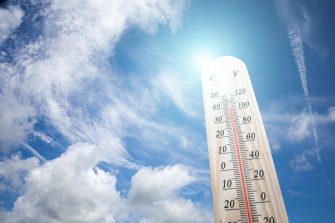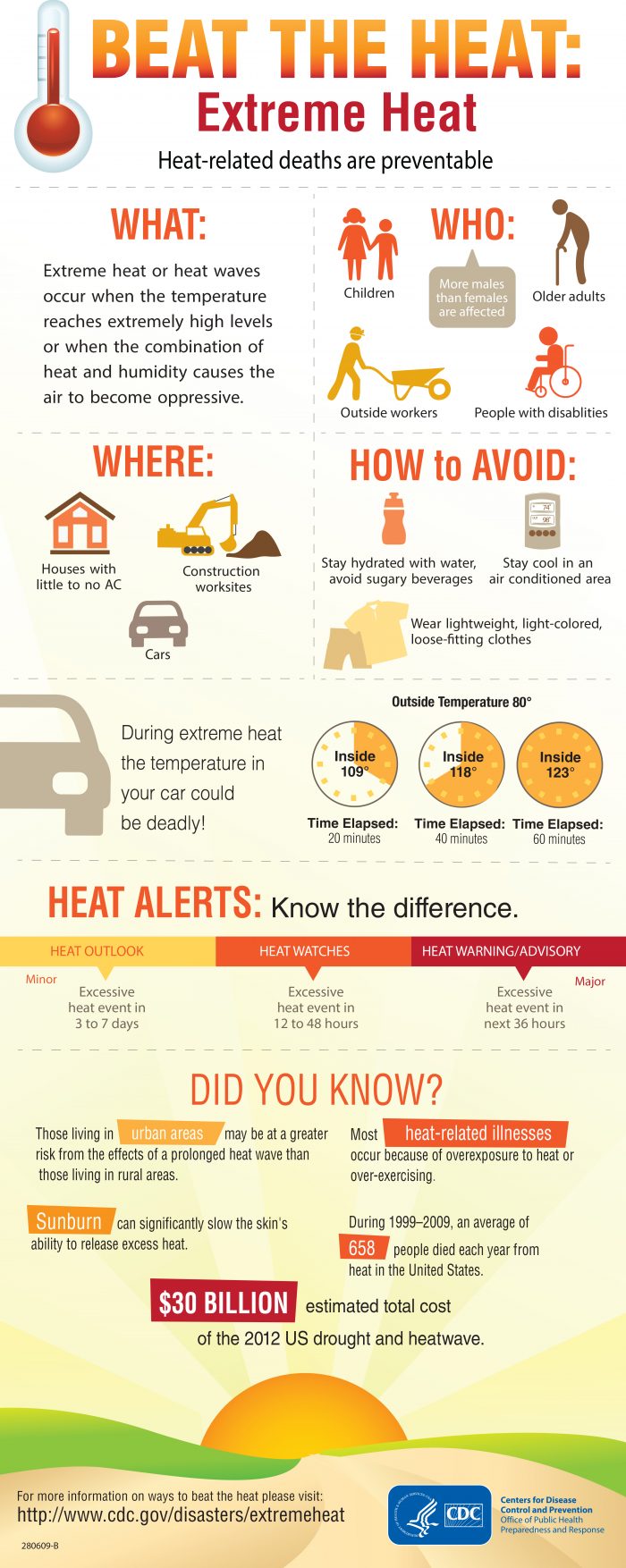Don’t Let the Heat Stop Your Summer Fun!

School’s out, the sun is bright, summer has settled into Tennessee… and it’s HOT! With the higher temps, and often higher humidity to accompany it, taking a few precautions when participating in outdoor activities is a wise move. Young and old alike are at risk of overheating in extreme temperatures. What is extreme to one person may not be extreme to another.
While the body has natural processes to cool itself, like sweating, sometimes it’s not enough. If a person’s body is heating up faster than it can cool itself, the person may become ill and experience a heat related illness. This can range from minor cramps to heat exhaustion to heat stroke and in some cases, even death.
According to the CDC, while anyone can experience heat related illness, there are some risk circumstances and conditions that increase an individual’s risk. The elderly and the very young, as well as those who have a mental illness or chronic disease, are at the highest risk. Some risk factors include:
- High levels of humidity
- Obesity
- Fever
- Dehydration
- Prescription drug use
- Heart disease
- Mental illness
- Poor circulation
- Sunburn
- Alcohol use
Even without risk factors, those in peak physical health may be affected when participating in strenuous activity and/or the temperature is at it’s extreme high. Therefore, it is important that people of all ages are aware of the risks, prevention, symptoms and treatments for heat related illness. The Centers for Disease Control (CDC) offers a number of suggestions to educate the public.

First, is prevention: STAY COOL
If you have the option to stay indoors when the temps are high, do so. When possible, plan to be indoors during the hottest part of the day and use the morning and evening hours for more strenuous activities. Even spending a few hours in an air-conditioned area helps your body stay cool when you return to the heat. If you are outside, utilize the shade and take rest breaks to allow your body time to rest and cool down. If your air conditioner goes out, plan an outing to a library or mall to cool down. Do not rely on an electric fan when the temps are in the high 90’s as they are not enough to prevent heat related illness.
Pay attention to your attire. Wear sunblock as sunburn reduces the body’s ability to cool itself. Light weight and light color clothing as well as wide brimmed hats are all good choices. A wet cool towel around your neck can be very refreshing during activities.
Do not allow anyone, especially children or elderly to sit in a parked car. Even with the windows cracked, the heat can increase to dangerous levels rapidly.
Consider your dining choices. Avoid hot and heavy meals as they increase your body temp. Additionally, cooking with the stove or oven can increase your home’s temperature. This is a great time to find your local farmer’s market and try cold salads and fresh vegetables!
Next is STAY HYDRATED!
In the heat, it is especially important to stay hydrated. Prevention is key. Don’t wait until you are feeling thirsty to drink. Sweating is one of the primary ways your body cools itself and it needs plenty of fluids to do that. Even if you out in the heat, but not active, you will likely need more water than you do when the temps are much cooler.
Start drinking water regularly and BEFORE you go out in the heat so your body already has the fluid it needs to keep you cool.
If you have a health condition that requires you to limit fluid intake or if you are on medication that affects your body fluid levels (such as water pills or antihistamines) talk to your doctor about what amount of fluid is appropriate for you. A cool wet towel may be an option to help cool your body and lower your need for fluid intake.
Choose your beverages wisely.
- Cool drinks are very refreshing, but if they are too cold they can cause stomach cramps. Many fresh fruits and vegetables are largely water. Consider having grapes, watermelon or another fresh fruit as a snack. You can also infuse various fruits in your water to provide variety of taste.
- Sugary, caffeinated and alcoholic drinks can make things worse by causing you to actually LOSE MORE fluid.
- Heavy sweating not only causes you to lose fluid, but it also removes salt and minerals from your body. Sports drinks can help with this but beware of the sugar content. You may want to alternate them with water to avoid excessive sugar. If you are on a restricted diet, (low-salt, diabetic, blood pressure, etc) talk to your doctor about the safest way for you to stay hydrated in the heat.
Remember you aren’t the only one who needs to stay hydrated. If you will have extra guests or workers at your home or work, be prepared to share cool water with them. Don’t forget pets! Leaving water in a shaded area can help as will freshening the water bowl more frequently than normal.
Lastly, STAY INFORMED!
Your local news station and the internet can help you stay up to speed about extreme heat in the forecast. Use that information to plan your activities when possible.
Because heat-related illness can cause confusion, work with a friend. Each of you can help monitor the other. Even if you are not in the same location, but will be working outside in the heat, you can call to check on each other periodically during the day.
If you fall into any of the risk factor categories, have a friend or relative check on you at least twice a day during heat waves. If you know someone in any of these categories, check-in twice a day. A physical visit is best, but if that isn’t possible, at least call. Of course, children or those with special needs that may not be able to understand, should be watched more closely.
Know the signs and symptoms of heat related illness. And know what to do if you or someone near you is experiencing symptoms. Learn more about symptoms to watch for as well as the first steps to take for treating heat-related illness at https://www.tnchiro/articles/dont-get-too-hot/ or view an informative graphic from the CDC HERE.
An active lifestyle doesn’t have to stop when the heat begins to rise. There are a number of ways you can keep moving safely. Maybe you take a swim. Take a break for a water balloon fight with the kids (or the kids at heart). Make your hiking destination a waterfall. Do your outdoor activities in the early morning, late afternoon or evening. Your doctor of chiropractic may have additional tips to share when you are in the office. Just ask! If you have not previously seen a chiropractor, you can find a TCA member doctor at https://www.tnchiro.com/find-a-doctor/.

RESOURCES:
Tips for Preventing Heat-Related Illness by CDC https://www.cdc.gov/disasters/extremeheat/heattips.html
About Extreme Heat by CDC
https://www.cdc.gov/disasters/extremeheat/heat_guide.html